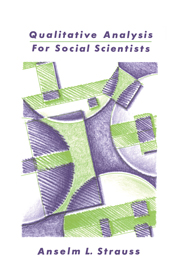Book contents
- Frontmatter
- Contents
- Preface
- 1 Introduction
- 2 Two illustrations
- 3 Codes and coding
- 4 Seminar on open coding
- 5 Memos and memo writing
- 6 Team meetings and graphic representations as memos
- 7 Excerpts that illustrate common problems
- 8 Integrative diagrams and integrative sessions
- 9 Integrative mechanisms: diagrams, memo sequences, writing
- 10 Presenting case materials: data and interpretations
- 11 Grounded formal theory: awareness contexts
- 12 Reading and writing research publications
- 13 Questions and answers
- 14 Research consultations and teaching: guidelines, strategies, and style
- Epilogue
- Appendix Discovering new theory from previous theory
- References
- Author index
- Subject index
1 - Introduction
Published online by Cambridge University Press: 26 January 2010
- Frontmatter
- Contents
- Preface
- 1 Introduction
- 2 Two illustrations
- 3 Codes and coding
- 4 Seminar on open coding
- 5 Memos and memo writing
- 6 Team meetings and graphic representations as memos
- 7 Excerpts that illustrate common problems
- 8 Integrative diagrams and integrative sessions
- 9 Integrative mechanisms: diagrams, memo sequences, writing
- 10 Presenting case materials: data and interpretations
- 11 Grounded formal theory: awareness contexts
- 12 Reading and writing research publications
- 13 Questions and answers
- 14 Research consultations and teaching: guidelines, strategies, and style
- Epilogue
- Appendix Discovering new theory from previous theory
- References
- Author index
- Subject index
Summary
PART 1
Some assumptions
A set of assumptions lies behind this approach to qualitative analysis, which first will be listed and then briefly discussed.
Very diverse materials (interviews, transcripts of meetings, court proceedings; field observations; other documents, like diaries and letters; questionnaire answers; census statistics; etc.) provide indispensable data for social research.
As compared with both the quantitative analysis of data and the actual collection of data by qualitative analysts, the methods for qualitatively analyzing materials are rudimentary. They need to be developed and transmitted widely and explicitly throughout the social science community.
There is need for effective theory – at various levels of generality – based on the qualitative analysis of data.
Without grounding in data, that theory will be speculative, hence ineffective.
Social phenomena are complex: Thus, they require complex grounded theory. This means conceptually dense theory that accounts for a great deal of variation in the phenomena studied.
While there can be no hard and fast rules governing qualitative analysis – given the diversity of social settings, research projects, individual research styles, and unexpected contingencies that affect the research – it is possible to lay out general guidelines and rules of thumb to effective analysis.
Such guidelines can be useful to researchers across a broad spectrum of disciplines (sociology, anthropology, political science, psychology, public health, nursing, and education) and, regardless of “tradition” or “theoretical approach,” just as long as they believe their work can be furthered by the qualitative examination of materials. Also, such analytic methods can be useful whether researchers are wedded to the idea of social science per se or to more humanistic versions of social research (“understanding,” “enlightenment”).
[…]
- Type
- Chapter
- Information
- Qualitative Analysis for Social Scientists , pp. 1 - 39Publisher: Cambridge University PressPrint publication year: 1987
- 1
- Cited by



